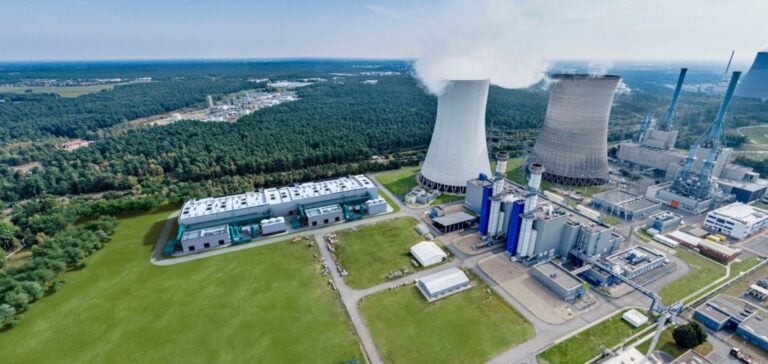RWE has confirmed the purchase of a 100 megawatt (MW) electrolyzer from Sunfire, a company specializing in electrolysis technologies.
This new equipment will be installed at the Lingen site in Germany, as part of the GET H2 Nukleus project, aimed at developing large-scale hydrogen production.
This pressurized alkaline electrolyzer is part of RWE’s strategy to diversify its energy solutions, while increasing the proportion of green hydrogen to meet industrial needs.
The equipment supplied by Sunfire will form the third phase of the GET H2 Nukleus project, bringing total production capacity to 300 MW.
The delivery includes ten modules of 10 MW each, which will represent around a third of the total capacity planned for the Lingen site.
This new stage is scheduled to be operational by the end of 2027, and is expected to produce up to two tonnes of green hydrogen per hour, mainly for industries in the Lower Saxony and North Rhine-Westphalia regions.
RWE-Sunfire collaboration strengthened
This contract follows RWE’s final investment decision (FID) to develop its hydrogen infrastructure.
The German company recently commissioned a 10 MW alkaline electrolyzer at the same Lingen site, in collaboration with Sunfire.
The new 100 MW order underlines RWE’s confidence in Sunfire’s technology and strengthens their cooperation.
This mutual trust enables both companies to actively participate in the expansion of the hydrogen market in Europe.
With the addition of this 100 MW electrolyzer, RWE completes its range of technologies for the production of green hydrogen. Prof. Dr. Sopna Sury, COO Hydrogen at RWE Generation, points out that this technological expansion enables the company to diversify its portfolio and explore new avenues for the use of alkaline electrolyzers on a large scale.
The aim is to ensure stable, continuous hydrogen production for its industrial customers.
Increased capacity to meet industrial demand
Demand for green hydrogen is growing rapidly in Europe, supported by favorable public policies and increasing investment in infrastructure.
Sunfire’s 100 MW electrolyzer at the Lingen site plays a crucial role in this context, increasing RWE’s hydrogen production capacity to meet industrial needs.
The integration of this new high-capacity electrolyser technology shows how companies in the energy sector are seeking to adapt to market developments.
The green hydrogen produced at the Lingen site will be used primarily for industrial applications, particularly in the chemical and metallurgical sectors, where there is a need to replace fossil energy sources with less polluting alternatives.
This initiative is part of a series of European projects aimed at developing a hydrogen economy capable of reducing dependence on fossil fuels.
Expanding the hydrogen value chain
Sunfire, already a supplier of electrolysis technologies to RWE and other energy companies, continues to expand its market presence.
Its SOEC (Solid Oxide Electrolysis Cell) high-temperature electrolyzer, operational at RWE’s Emsland gas-fired power plant since 2023, bears witness to its ability to develop innovative solutions for hydrogen production.
With this new 100 MW contract, Sunfire strengthens its position in the European electrolysis market and contributes to the ramp-up of green hydrogen production in Europe.
RWE, together with partners such as Uniper and project developers P2X Solutions and Copenhagen Infrastructure Partners, is looking to optimize the production of green hydrogen.
The partnership with Sunfire for the Lingen project is part of this overall strategy to secure significant production capacity while diversifying the technologies used.






















